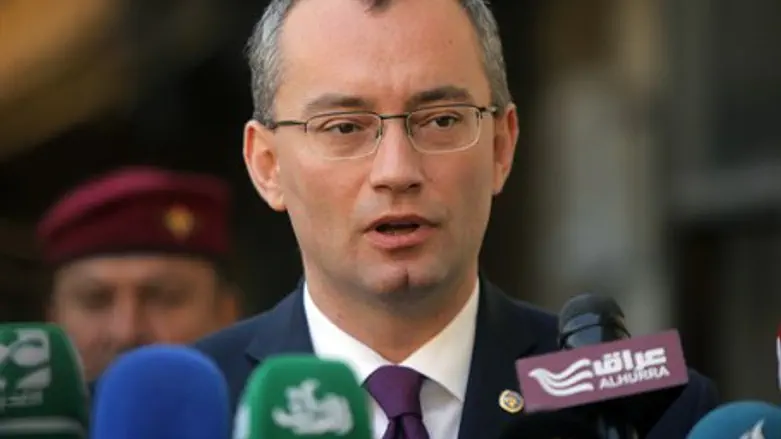
The UN’s special envoy to the Middle East told the Security Council on Thursday that Israeli and Palestinian statements about a commitment to peace need to be translated into “concrete and sustained actions on the ground.”
“Now is the time to act decisively to reverse the growing perception that the two-state solution is on life-support, slowly dying a death ‘by a thousand cuts,’” warned the envoy, Nickolay Mladenov, during a briefing to the Security Council about the situation in the region over the past month.
Measures undertaken to improve the situation must not be considered an end unto themselves but part of a broader political framework with the goal of achieving a final status agreement, which will require committed engagement with key Arab states, Mladenov said, according to a statement released by the UN.
“Given the region's massive transformation, it is imperative – perhaps more than ever before – that a permanent settlement be found, based on the concept of two states, Israel and a sovereign, contiguous and viable Palestine, living side by side in peace, security and mutual recognition,” he added.
Today, he continued, the two sides are further apart from that goal “than ever.” Support for the two-state solution among both Palestinians and Israelis is fading away, while the current situation on the ground is not sustainable, he warned.
Mladenov said he welcomed the recent decision by Israel to add 8,000 new work permits for Palestinian Arabs from Judea and Samaria, but also condemned Israel for “unilateral activities” such as “settlement construction”.
“While settlement expansion has slowed of late, planning for related infrastructure has not ceased. I am concerned by reports about the imminent approval of new residential units in the occupied West Bank,” he said.
Mladenov also called on all Palestinian Arab groups to avoid “in-fighting” and find common ground, on the basis of non-violence and reconciliation, to achieve national unity which is critical for a two-state solution.
In recent months there has been renewed pressure on both Israel and the Palestinian Authority (PA) to resume talks based on the “two-state solution”.
UN Secretary-General Ban Ki-moon recently urged Prime Minister Binyamin Netanyahu to translate into action his commitment to a two-state solution.
Those comments came in the wake of comments by Netanyahu during the recent election campaign in Israel, when the Prime Minister declared in a series of interviews he would do everything in his power to prevent the establishment of a Palestinian state, angering Western leaders.
He appeared to backtrack after the election, explaining in an interview that he wants “a sustainable, peaceful two-state solution" but Western leaders have continued to express skepticism that Netanyahu is being sincere.
Earlier this week, the European Union said it will explore setting up a new international format to breathe life back into the stalled peace process between Israel and the Palestinians.
EU foreign affairs chief Federica Mogherini, fresh from her role in the Iran nuclear deal, said she was working on an idea for an "international support group."
